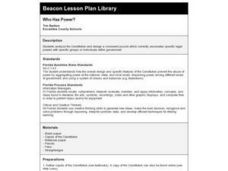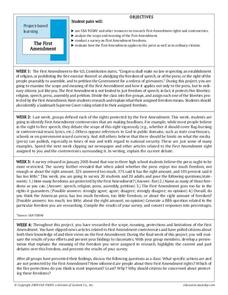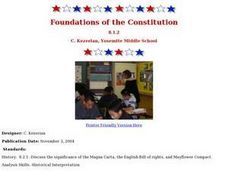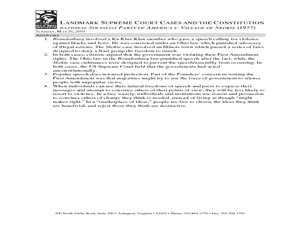School Improvement in Maryland
Affirmative Action
Do the government's affirmative action policies promote equity in the United States? The Fourteenth Amendment to the US Constitution and affirmative action policies come under scrutiny in an activity that asks class members to...
Curated OER
The Government and Natural Rights
High schoolers are introduced to some basic ideas the Framers used in creating the kind of government they thought would best protect the natural rights of each individual and promote the good of all. At the conclusion of the lesson,...
Curated OER
Who Has Power?
Fourth graders discuss abuse of power in government and examine the Constitution for specific powers in each branch. They create a crossword puzzle utilizing terms and information regarding division of government powers and federalism
Curated OER
The Beginnings of Constitutional Government
Students examine excerpts of Thomas Paine's Common Sense. For this early American history lesson, students read Paine's pamphlet and analyze the information according the rubric provided.
Curated OER
Public Demonstrations - Lesson Plan
Students examine various handouts to determine the value, necessity and potential limitations of assembly and public demonstrations. They then select a side and debate pre-provided questions.
Curated OER
The Legislative Branch
Students identify and describe the key terms as they relate to the Legislative Branch. Students describe how members of Congress are selected, how laws are created, and two of the limits on powers of Congress.
Curated OER
A "Clear and Present Danger"
Students define what is meant by clear and present danger. In this First Amendment lesson, students listen to their instructor present a lecture regarding the details of the Sedition Act of 1798. Students consider the constitutionality...
Curated OER
Freedom of Expression in Special Places
Students identify at least three places presenting First Amendment problems. They analyze how the First Amendment applies to school newspapers. Students argue for and against limiting First Amendment rights in school. They analyze th...
Curated OER
Teaching about the First Amendment
Students defend the Constitution against a group of Senators who decide that all media must be approved by the government, all Americans must take a loyalty oath, join an official U.S. religion and subscribe to approved clubs.
Curated OER
Your Map of Rights
Students explore the Bill of Rights, which rights have limitations on them, and how these rights apply to their personal lives. They write their own Bill of Rights for the class community.
Curated OER
The Civil War
Although we currently focus on Abraham Lincoln's positive contributions in creating a more equal society, the truth is that Lincoln was actually a controversial character in his time! After studying the Civil War, give your high...
University of Arkansas
Assessment and Discussion
"Without concerned citizen action to uphold them (human rights) close to home; we shall look in vain for progress in the larger world. . ." Eleanor Roosevelt's comment is used to set the stage for the conclusion of a five-lesson unit...
Curated OER
Developing Characterizations by Creating Stereotypes
Students examine past and present cultures through theater. They interpret how theater reflects society. Students engage in the process that constitutes creation and performance in the theater. Students explore the forces that shape...
Curated OER
The First Amendment
Eleventh graders examine the First Amendment. In this US Government lesson plan, 11th graders analyze the scope and meaning of the first amendment. Students conduct a survey on First Amendment freedoms. Student evaluate the First...
Curated OER
Government: The Mystery Epidemic
Students are able to identify some roles of government in dealing with the prevention and treatment of skin cancer. They are able to list two reasons why the occurrence of skin cancer in youths has increased.
Curated OER
The Nonlegislative Powers
Eleventh graders examine the powers of Congress. For this American Government lesson, 11th graders read about Congress. Students complete a worksheet on their findings.
Curated OER
Government: War Powers Limitations
Students examine historic examples of authority during wartime. They interpret the Fifth Amendment. They debate the merits of the Patriot Act.
Curated OER
Law Day: Constitutional Law Outline
Students receive information about laws. Some of the categories include powers of the federal government, federal powers vs. state powers, and the Bill of Rights. It is in an outline form that looks like the student follows along with...
Curated OER
Foundations of the Constitution
Eighth graders explore the Magna Carta and the Mayflower Compact.
Curated OER
Landmark Supreme Court Cases and the Constitution: Reynolds v. United States (1878)
Young scholars examine the impact of court decisions. In this Supreme Court instructional activity, students read the Reynolds v. United States (1878) case study regarding first election decided by the House of Representatives....
Curated OER
Landmark Supreme Court Cases and the Constitution: National Socialist Party of America v. Village of Skokie (1977)
Students examine the impact of court decisions. In this Supreme Court lesson, students read the National Socialist Party of America v. Village of Skokie (1977) case study regarding First Amendment Rights. Students take notes on the case...
School Improvement in Maryland
Dividing the Powers of Government
Who does what? To develop an understanding of the balance of power between the US federal and state governments, class members research responsibilities in terms of legal systems, security issues, economic activities, lawmaking, and...
Theodore Roosevelt Association
Interpreting the Past; Assessing Its Impact on the Present
Even though the presidency of Theodore Roosevelt ended over 100 years ago, we can still learn something from his stances and policies that is applicable today. Class members first look over a list of prevalent political issues from the...
School Improvement in Maryland
Court Proceedings Civil Cases
What's the difference between civil and criminal law? How do the court proceedings differ in these two types of trials? How do the standards of proof differ? Why do these differences exist? As part of their examination of the US court...

























